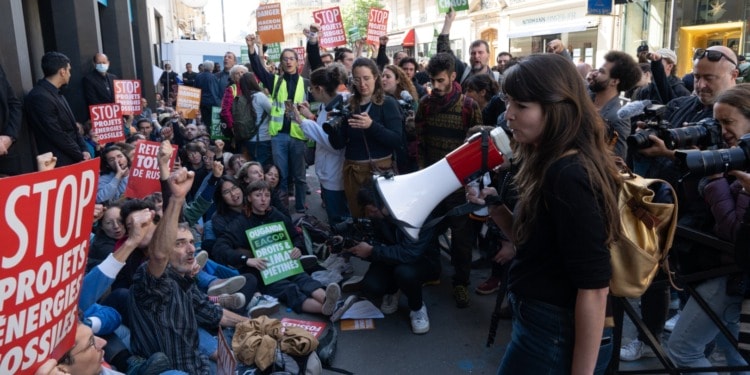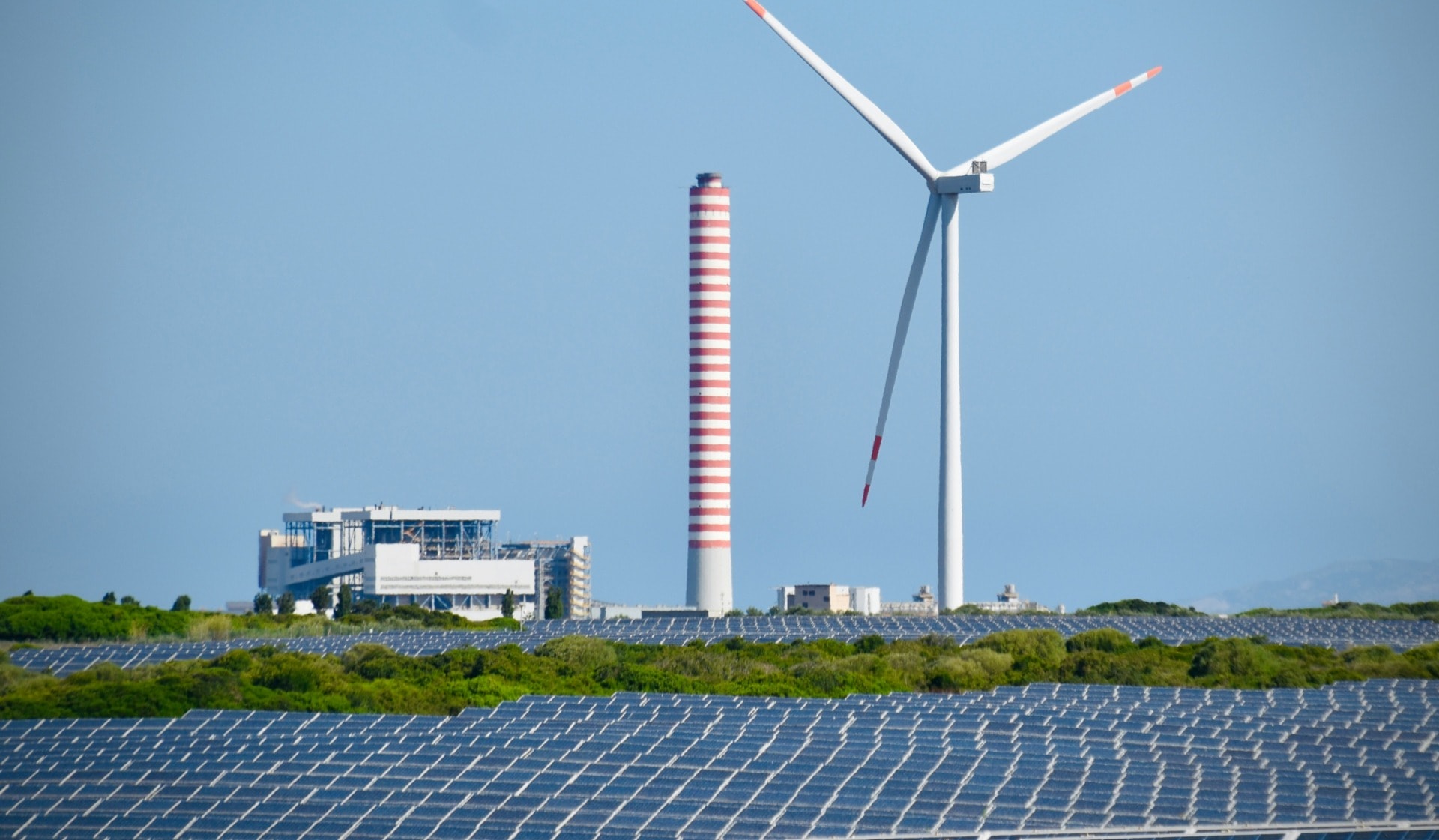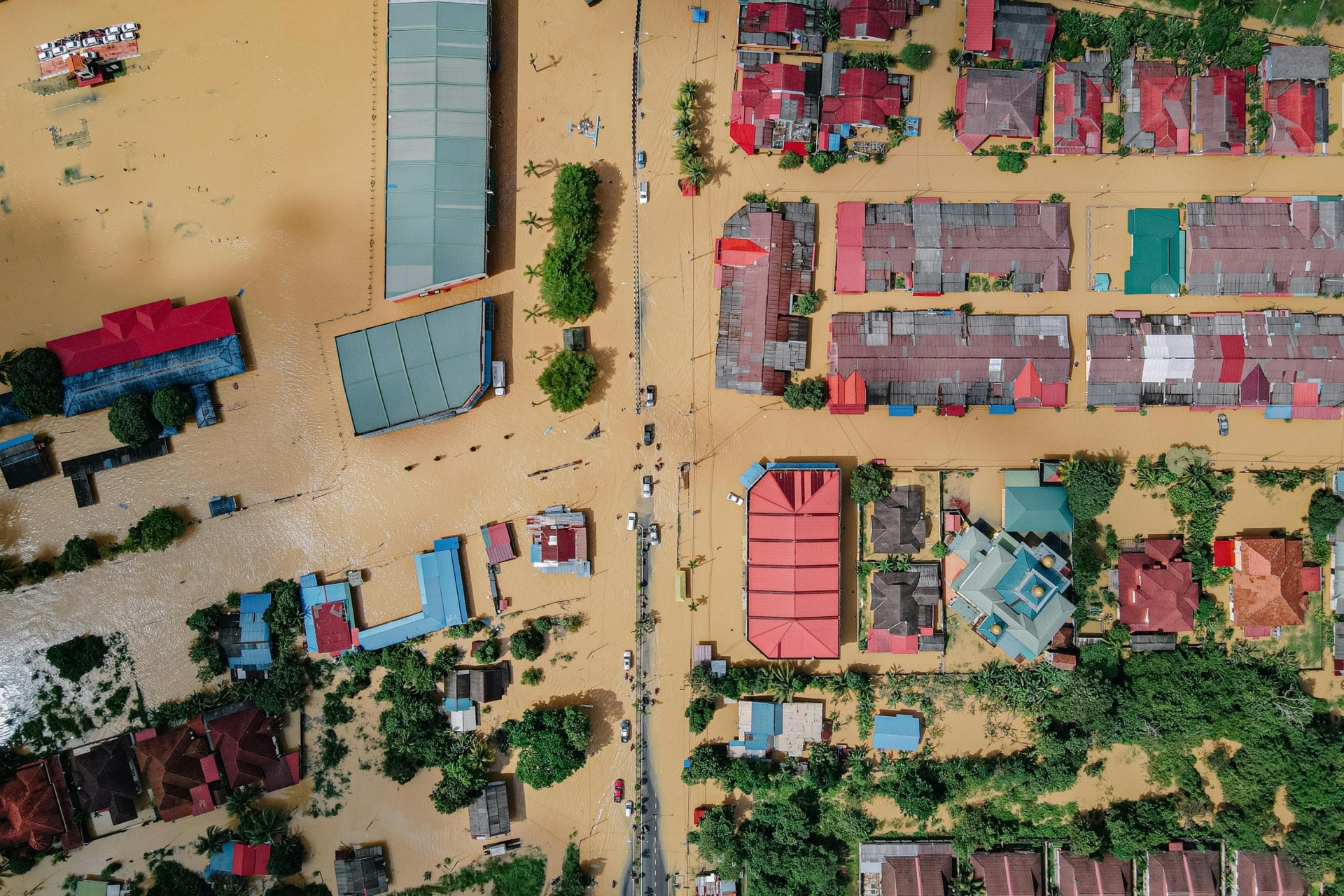Several hundred climate protestors gathered yesterday to blockade the Salle Pleyel in Paris where the TotalEnergies Annual General Meeting of Shareholders (AGM) was to be held. They demanded that the French oil and gas major put an immediate end to new fossil fuel projects and retreat from Russia where it still holds significant stakes.
Representing Greenpeace, Extinction Rebellion, Youth for Climate, and other environmental organisations, protesters denounced TotalEnergies’ climate plan as an attempt to greenwash “lethal” oil and gas projects like the East African Crude Oil Pipeline (EACOP) in Uganda and Tanzania, or the Arctic Liquefied Natural Gas project in the Russian Arctic.
They also accused President Emmanuel Macron and the French government of providing the oil and gas behemoth with political, financial, and diplomatic support despite the company’s projects threatening to destroy any hope of maintaining global warming under the 1,5°C limit decided by the Paris Agreement in 2015.
TotalEnergies apologized for the “inconvenience” in a tweet addressed to its investors, and invited them to follow the discussions via live transmission on their website.
The report detailing their strategy to attain net-zero emissions by 2050 was finally approved by 88.89% of their investors. Last month, a minority group of eleven shareholders proposed a resolution on bringing the company’s emissions targets in line with the Paris climate deal. The company rejected it.
“The transposition of the Paris agreement into company statutes would open a field of potentially huge and dangerous legal disputes,” CEO Patrick Pouyanné told investors in a mostly empty room.
Fossil fuels still make up 91% of TotalEnergies’ production and 71% of their current investments.

TotalEnergies involved in 22 “carbon bomb” projects around the world, 4 of which are new
Like the rest of the world’s fossil fuel majors, and despite the urgent call from IPCC scientists to put an immediate end to all new fossil fuel projects, TotalEnergies’ short-term expansion plans involve the start of gigantic oil and gas projects across the globe. Also known as “carbon bombs,” these massive projects would individually result in at least a billion tonnes of carbon emissions over their lifespan, completely ruining the chance to maintain global warming well under 2°C. Ultimately, they are bound to trigger a climate catastrophe.
A recent study identified a total of 425 carbon bombs across the globe, 40% of which had not started extraction in 2020. TotalEnergies is currently involved in 22 such projects, whose cumulated emissions could reach 45,6 gigatons of CO2.
Four of them are very new, they had not reached their development stage in 2021, meaning that TotalEnergies decisively chose to ignore the IPCC reports and the International Energy Agency (IEA) “Net Zero by 2050” roadmap which outlines a low-cost pathway toward a sustainable and resilient energy economy supported by solar and wind instead of fossil fuels.
One of these projects, Arctic LNG 2, is located in the Russian Arctic, one of the fastest-warming regions in the world and has sparked further controversy after Vladimir Putin’s invasion of Ukraine.
Up to date, TotalEnergies is the only European major still operating in Russia. Pouyanné, TotalEnergies’ CEO, said the group would exit its Russian assets if sanctions required it.
Related articles: REPowerEU: The EU’s Plan to Rapidly Reduce Dependence on Russian Energy and Tackle the Climate Crisis | ‘Toxic’ Bond Market Targeted for Financing Fossil Fuel Expansion
Endangering ecosystems and communities in East Africa
Another project which protesters denounced yesterday is the East African Crude Oil Pipeline (EACOP), a planned 1,443 km long heated pipeline which would transport oil from more than 400 wells situated in the Tilenga and Kingfisher fields on the shores of Lake Albert in Uganda, to the port of Tanga on the Indian Ocean coast in Tanzania. EACOP currently is the largest heated pipeline project in the world.
Environmental organizations warned the project was bound to trigger humanitarian disasters on top of environmental collapse. The pipeline corridor is currently planned to traverse seven forest reserves, two game-controlled areas and one open area that supports wildlife management, covering a total distance of 295 km of protected lands, threatening to shatter the ecosystems they support.
Camille Etienne, an activist for environmental and social justice, told the online media platform Brut on Wednesday: “[The pipeline] goes through two of the largest wildlife reserves of Uganda and they [TotalEnergies] said they would simply ‘move’ those ecosystems somewhere else. I’m wondering how they’re planning to ‘move’ an ecosystem since the principal feature of an ecosystem is that it is where it is, anchored locally and interacting with what surrounds it.”
The pipeline also passes through densely populated areas, meaning the project’s realisation will require the mass resettlement of these mostly rural populations. As Uganda’s water resources are also put at risk of contamination through potential spills, activists voice their concerns over the triggering of more humanitarian crises in a region already affected by severe global warming and conflicts:
“As I am speaking to you, 100 000 people are displaced by this project,” said Camille Etienne. Uganda is a very agricultural country, and these people are told to leave without any real compensation, so they leave, but where do they farm? We’re paving the way for famines.”
The IPCC report is clear: the moment is “now or never” for governments and companies to implement policies that will effectively and swiftly cut down carbon emissions globally. Yet, gas and oil majors worldwide keep pushing fossil fuel extraction and exportation projects of colossal scale, raising billions of dollars in bonds to finance trillions of dollars’ worth undertakings that are bound to trigger environmental collapse.
As the war in Ukraine triggers energy panic in Europe, resulting in many European countries neglecting policies to cut down emissions, the development of plans like REPowerEU, which aims at both independence from Russian gas and oil and at the expansion of renewable energy, must become a priority if we are to mitigate the tremendous damage brought by climate change.
Editor’s Note: The opinions expressed here by Impakter.com columnists are their own, not those of Impakter.com — In the Featured Photo: Climate protesters physically block the entrance of the Salle Pléyel where the TotalEnergies Annual General Meeting was to be held. Featured Photo Credit: Elsa Palito/Greenpeace France.














